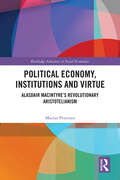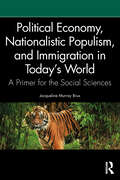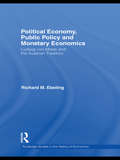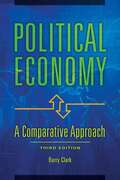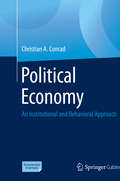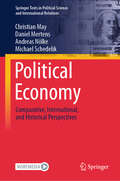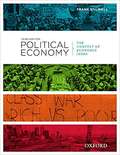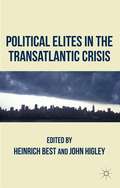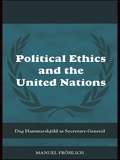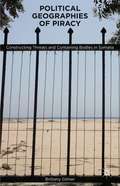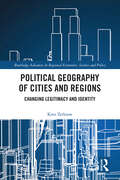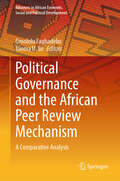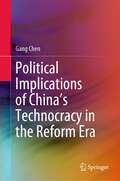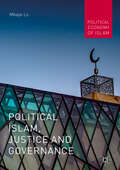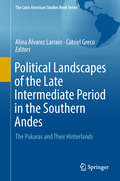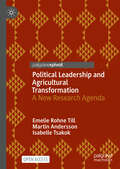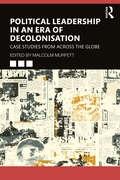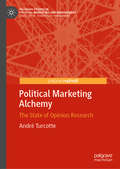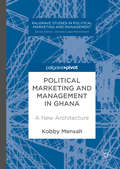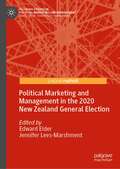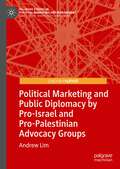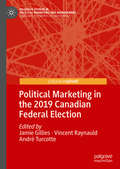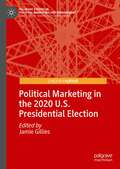- Table View
- List View
Political Economy, Institutions and Virtue: Alasdair MacIntyre’s Revolutionary Aristotelianism (Routledge Advances in Social Economics)
by Matías PetersenThis book engages with a radical critique of the modern state and the contemporary economic order: Alasdair MacIntyre’s ‘revolutionary Aristotelianism’ project. Central to this critique is the idea that the moral norms that markets and states tend to reproduce or reinforce are an obstacle to the development of practical judgement. The book outlines MacIntyre’s theory of practical reason and discusses some of the institutional arrangements that can be derived from it. It also explores the growing body of literature which has started to examine the extent to which alternative forms of social organisation might be more compatible with MacIntyre’s account of the virtues. This literature includes various proposals for alternative political and economic arrangements, ranging from certain forms of market socialism to the promotion of different forms of mutual and cooperative enterprises. Finally, the book offers an account of the type of institutional analysis required for the advancement of the revolutionary Aristotelianism project. This is achieved by showing how some key features of the Bloomington School of political economy are not only compatible with MacIntyre’s political philosophy, but also that a synthesis between neo- Aristotelian moral philosophy and the work of the Bloomington School offers a robust alternative for revolutionary Aristotelians. Thus, the book defends the idea that MacIntyre’s account of human flourishing is more likely to be realised, although imperfectly, in a polycentric social order. This book will be of interest to social scientists working in questions of political economy as well as political and moral philosophers.
Political Economy, Nationalistic Populism, and Immigration in Today's World: A Primer for the Social Sciences
by Jacqueline Murray BruxPolitical Economy, Nationalistic Populism, and Immigration in Today’s World: A Primer for the Social Sciences is a core text for a multidisciplinary range of courses in economics, political science, sociology, international studies, public policy, and the social sciences.The text weaves together an understanding of the interconnected topics of global nationalistic populism, authoritarianism, immigration, conditions in developing countries, social systems and safety nets, diversity, and ultimately, happiness as measured by global happiness surveys.The text is designed for a global audience through the use of examples and case studies in a manner that is clear to students and provides all prerequisite knowledge for undergraduates. It includes content on countries across the developing world, Europe, Canada, and the United States. There is considerable emphasis on the politics and ideologies of Europe and the United States and how these relate to immigration and impact each other.
Political Economy, Public Policy and Monetary Economics: Ludwig von Mises and the Austrian Tradition (Routledge Studies In The History Of Economics Ser.)
by Richard M EbelingAustrian economist, Ludwig von Mises, was one of the most original and controversial economists of the 20th century, both as a defender of free-market liberalism and a leading opponent of socialism and the interventionist-welfare state. He was both the grant designer of a political economy of freedom and a trenchant, detailed critic of government regulatory and monetary policies in the first half of the 20th century. This fascinating book explores the cultural currents of anti-Semitism in Austria before and after the First World War that Mises confronted as an Austrian Jew; his analysis of Austria-Hungary’s establishment of a gold standard; Mises’ multi-sided activities in the years after the World War I in stemming a hyperinflation, opposing government fiscal mismanagement, and resisting misguided policies during the Great Depression; and his analysis of how Europe plunged into World War II and the policies to restore freedom and prosperity in the post-war period. It also discusses the confrontation between the Austrian Economists and the Keynesians over the causes and cures for the Great Depression, as well as how Mises’ "Austrian" approach to money and the business cycle contrasted with both the ideas of Joseph A. Schumpeter and the Swedish Economists of the interwar period. This volume breaks new ground in placing Ludwig von Mises’ many original views on political economy, public policy and monetary economics in the historical context of his time, especially during the interwar period when he was a senior economic analyst for the Vienna Chamber of Commerce and after his arrival in America during World War II. The book will therefore be of interest to students and researchers in monetary economics, political economy, expectations theory and the market process, and the history of economic thought.
Political Economy: A Comparative Approach, 3rd Edition
by Barry ClarkAs 21st-century political debate becomes polarized across ideological lines, students and citizens need to understand the underlying values on which contending arguments are based. The current political gridlock calls for a deeper appreciation of the competing perspectives in political economy. Now revamped for a third edition, Political Economy: A Comparative Approach supplies a truly interdisciplinary examination of the development and evolution of political economy from the Enlightenment onward, drawing material from the realms of political theory, sociology, philosophy, and history as well as from economics to present detailed comparisons of competing perspectives on a variety of current issues. The book begins with an introduction to political economy that provides readers with an overview of the historical development of the discipline, followed by in-depth analyses of four ideological perspectives in political economy―Classical Liberalism, Radicalism, Conservatism, and Modern Liberalism. The author then applies each of the four ideological perspectives to a range of contemporary issues, such as the role of government, economic instability, poverty, labor relations, discrimination, education, culture, the environment, and international trade. Readers will gain insight into the methods and practice of political economics as well as better understand the history of political/economic thought and the effects of historical processes―European industrialization, for example―on modern debates.
Political Economy: An Institutional and Behavioral Approach
by Christian A. ConradThis textbook takes a new approach to political economy: it combines the well-known non-quantitative theories with the findings of behavioral science and other disciplines such as psychology and sociology. The question of how people behave and how such behavior can be guided towards moral welfare for everyone is the focus of this book. The knowledge is first derived scientifically, then the results are presented in summaries and conclusions. Case studies provide a link to practice. By means of exercises and behavioral games, readers can apply and deepen their acquired knowledge.
Political Economy: Comparative, International, and Historical Perspectives (Springer Texts in Political Science and International Relations)
by Andreas Nölke Christian May Daniel Mertens Michael SchedelikThis textbook offers a comprehensive introduction to Political Economy. It combines comparative,international and historical perspectives into a holistic framework of analysis. Drawing on the workof Karl Polanyi, the book shows how capitalist economies differ around the globe and how they areembedded in the international economic order. Through a critical-institutionalist lens, it helps toaccount for the evolution of contemporary capitalism and addresses current topics at the intersection of political science and economics.Students and instructors can draw on supplementary material, such as Power Point slides withall figures and tables as well as the Springer Nature Flashcards app with exercises.
Political Economy: The Contest Of Economic Ideas
by Frank StilwellNow in its third edition, Political Economy: The Contest of Economic Ideas is a fully updated survey of the political economy and its connection with social concerns. Moving beyond conventional treatments, this unique text offers a "big-picture" overview of the analytical tools and value judgments associated with competing schools of economic thought. Featuring an exceptionally engaging writing style, this text makes the complexities of contesting economic ideas--including classical political economy and Marxist economics and neoclassical economies and neo-liberalism--clear and accessible to students. The third edition includes a new chapter on the economics of happiness and new sections on current issues like the global financial crisis, climate change, and "affluenza."
Political Elites in the Transatlantic Crisis
by John Higley Heinrich BestThe United States and most European countries have experienced an economic-political crisis unmatched in severity since the Great Depression. The crisis discredits the thesis of a nexus between free markets, unending economic growth and liberal democracy. It is obvious that elites principal decision-makers in powerful public and private organizations at national and supranational levels have been pivotal actors in this crisis. It has without doubt been the hour of elites. What do elites' responses to the crisis reveal? How are elites altered by it? In whose interests have they acted? Although the authority of elites is always subject to dispute, has the crisis damaged it irreparably? What do decisive actions by non-elected elites and leaders in the Federal Reserve, European Central Bank, European Commission and other institutions mean for democracy? In analyses covering five years of crisis, from 2008 to mid-2013, leading scholars in the field address these questions in order to understand the role of elites in the transatlantic crisis. "
Political Ethics and The United Nations: Dag Hammarskjöld as Secretary-General (Cass Series On Peacekeeping Ser.)
by Manuel FroehlichBased on a wealth of sources, files and interviews, and including previously unpublished material, this book explores the foundations of the political ethics of Dag Hammarskj�ld, the second Secretary-General of the United Nations, examining how they influenced his actions in several key crisis situations. Hammarskj�lds political innovations, such
Political Geographies of Piracy
by Brittany GilmerPolitical Geographies of Piracy examines the new security-development framework for combating piracy off the coast of Somalia. It demonstrates how counter piracy actors, particularly in the development sector, are reworking territorial sovereignties and reproducing markets of security and development in Somalia. Underlying onshore counter piracy strategies is a desire to both simultaneously secure and develop Somalia. However, the wider goal of these security-development strategies is to prevent and contain particular racialized and gendered actions and bodies on shore in Somalia. Drawing upon unique insider knowledge of the international counter piracy regime, Gilmer reveals the institutional machinations at stake in efforts to simultaneously combat and profit from Somali piracy. Research conducted on the ground in Somalia, and with convicted piracy prisoners detained in the Seychelles, also provides a rare glimpse into how security-development strategies for combating piracy are being promoted and resisted among various Somali communities.
Political Geography of Cities and Regions: Changing Legitimacy and Identity (Routledge Advances in Regional Economics, Science and Policy)
by Kees TerlouwThis monograph presents a novel typology of relational and territorial perspectives on legitimacy and identity. This typology is then applied to two different political and historical contexts, namely the trajectories of the Amsterdam metropolitan region in the Netherlands and the Ruhr metropolitan region in Germany. The historical discussion spans 500 years, providing valuable depth to the study. Taken as a whole, the book provides a new perspective within the territorial-relational dichotomy and the geographies of discontent debate. Its key insights are that identity and political legitimacy is embedded in history, and that both relational and territorial perspectives on these issues are time and place dependent. This book will be stimulating reading for advanced students, researchers and policymakers working in political geography, human geography, regional studies, and broader social and political sciences.
Political Governance and the African Peer Review Mechanism: A Comparative Analysis (Advances in African Economic, Social and Political Development)
by Omololu Fagbadebo Isioma U. IleThis book presents a comparative analysis of political governance and includes case studies from various African countries. It further sheds light on the paradox of poverty despite Africa's plentiful resources and traces its roots in historical legacies of colonialism and leadership failures. The book examines the African Peer Review Mechanism (APRM) initiated by the African Union (AU) in 2003 and explores the APRM's role in promoting sustainable development, political stability, and integration. Against this background, the book dissects the four thematic areas of the APRM, with a focal point on democratic and political governance, illuminating challenges and proposing solutions. In case studies on selected African countries, contributors present governance structures, highlighting the struggle for accountability, representation, and public participation. The book highlights alarming indicators of weak governance, including corruption and declining public engagement, and reflects Africa's journey toward effective governance. By doing so, the book scrutinizes African governing systems' responses to crises and offers valuable insights into the continent's quest for progress and transformation.
Political Implications of China's Technocracy in the Reform Era
by Gang ChenThis book focuses on the evolution of technocracy in contemporary Chinese politics and its implications in China’s elite politics and policymaking. The rise of technocracy in contemporary Chinese politics is not only attributed to the meritocratic tradition based on civil service exams in ancient China but also tied to the current authoritarian political system that relies on the top-down cadre promotion approach instead of public elections. Leaders with technocratic backgrounds have brought changes to China’s political landscape since technocrats tend to solve governance issues using technical solutions in an industrialized society as compared to pure politicians and revolutionaries, who are inclined to resort to political, and sometimes populist, options. This book examines the specific tech areas from which top technocrats have been emerging in Chinese politics, which include military and aerospace industry, public health, engineering and science, economics and finance, as well as information technology. It is a unique research monograph based on research on China’s evolving technocracy and its political, economic and international implications that provides a detailed and thorough study of the country’s industrial policies being reshaped by these technocrats and their likelihood of joining the Chinese Communist Party’s top echelon in the next five to ten years.
Political Islam, Justice and Governance (Political Economy of Islam)
by Mbaye LoThis book argues that political Islam (represented by its moderate and militant forms) has failed to govern effectively or successfully due to its inability to reconcile its discursive understanding of Islam, centered on literal justice, with the dominant neo-liberal value of freedom. Consequently, Islamists' polities have largely been abject, often tragic failures in providing a viable collective life and sound governance. This argument is developed theoretically and supported through a set of case studies represented by the Muslim Brotherhood in Egypt (under President Muhammad Morsi’s tenure), Hassan Turabi's National Islamic Front in Sudan and The Islamic State in Iraq and Syria (ISIS). It is ideal for audiences interested in Regional Politics, Islamic Studies and Middle Eastern Studies.
Political Landscapes of the Late Intermediate Period in the Southern Andes: The Pukaras And Their Hinterlands (The Latin American Studies Book Series)
by Alina Álvarez Larrain Catriel GrecoThis book studies the relationship between pukaras and their surrounding landscape, focusing on the architectural and settlement variability registered in both contexts. It is the outcome of a symposium held at the XIX National Congress of Argentine Archaeology (San Miguel de Tucuman, August 8–12, 2016) entitled, "Pukaras, strategic settlements and dispersed settlements: Political landscapes of the Late Intermediate Period in the Southern Andes." Based on the topics discussed at the event, this book presents nine case studies covering a large geographic area within the Southern Andes (northwestern Argentina, northern Chile and southern Bolivia), and breaking the national barriers that tend to atomize pre-Hispanic landscapes.The respective chapters cover a wide range of themes: from architectural and settlement variability, ways to build and inhabit space, social segmentation and hierarchy; to endemic conflict, analysis of accessibility and visibility, spatiality and temporality of landscapes; as well as new dating. This book goes beyond the Late Intermediate Period (LIP) analyses from the perspective of fortified settlements and material evidence related to war, by placing the focus on how ancient political landscapes were constructed from the relation between the pukaras and other sites as part of the same territory.The methodologies used include pedestrian surveys, photogrammetric surveys with UAVs (unmanned aerial vehicles) or drones, topographic and architectural surveys, excavations of households, ceramic and rock art analysis, and spatial analysis with geographic information systems (GISs). Given the numerous thematic interconnections between the contributions, the Editors have organized the chapters geographically, moving from south to north: from the southern valleys of Catamarca Province in Argentina to Lipez in the southern part of the Bolivian Altiplano, passing through the Calchaqui valleys of Catamarca, the puna and Quebrada de Humahuaca of Jujuy in northwest Argentina and the Antofagasta region in northern Chile.The book provides valuable new theoretical and methodological perspectives on the study of political landscapes of the Late Intermediate Period in the Southern Andes .
Political Leadership and Agricultural Transformation: A New Research Agenda
by Isabelle Tsakok Martin Andersson Emelie Rohne TillThis open access book examines the impact of political leadership on agricultural transformation to understand why cases of successful agricultural transformation are so rare in the developing world. It highlights the importance of leadership and its interaction with the socio-political system as a key factor impacting agricultural transformation. The book takes a first step in systematically exploring commonalities in the role played by the political leadership in successful and less successful agricultural transformations, drawing from an analysis of Taiwan, Ethiopia, the Philippines, and Malawi. This book provides a deeper understanding of leadership dynamics, facilitating the work of unlocking new pathways to, and generating new policy options for, sustainable and impactful agricultural change. It will be relevant to students, researchers, and policymakers interested in agricultural economics, the political economy, and development economics.
Political Leadership in an Era of Decolonisation: Case Studies from Across the Globe
by Malcolm MurfettWhat is leadership, and why is it so important? In what ways does it look very different in different contexts, and in what ways does it look the same? Malcolm Murfett brings together a range of emerging and established scholars to examine these questions in light of some of the mid-twentieth century’s most intriguing national leaders. In a series of striking biographical chapters, lessons are drawn from the apartheid era in South Africa, Lee’s remarkable socio-economic transformation of Singapore, Castro’s revolutionary overhauling of Cuba, and the playing out of Bandaranaike’s populist agenda in Sri Lanka. The book illuminates what Brezhnev and Nixon were looking for in the Cold War and what happened when the people turned against Nyerere in Tanzania, the Shah in Iran, and Ceauşescu in Romania. These case studies address what leadership meant for the individuals whose record in power is being examined. These are not idealised portraits of ‘how to do leadership’ but warts-and-all portrayals of exceptional individuals who scrabbled their way to the top and stayed there for several years during a period of great change. Business schools have long studied the theoretical axioms of corporate leadership. What this book does, however, is to move beyond the theory into the practical realm of politics and statecraft. This is a fascinating book on leadership that will be of interest for students, researchers, and practitioners studying leadership in business and politics, as well as for students of global history, decolonisation, and the Cold War.
Political Legitimacy and Global Capital Markets: Malaysia's 1MDB (A)
by Meg Rithmire Courtney HanIn May 2018, Malaysia's 14th General Election saw a change of power that many thought they would never witness in their lifetimes. The political party that had ruled Malaysia for 60 year was kicked out of office by a 92 year-old challenger, Mahathir Mohamed, who had also been its leader and longest serving prime minister. These surprising events seemed to involve a financial scandal of historic proportions. The ousted Prime Minister, known as Najib, was associated with a sovereign wealth fund, 1 Malaysia Development Berhad (1MDB), that had, with the aid of Goldman Sachs, borrowed 7 billion USD in global capital markets, all of which was squandered and some in remarkable fashion. An unknown young Malaysian of Chinese descent, Jho Low, had siphoned billions into his personal accounts, throwing parties for celebrities from Bangkok to LA. Was the Malaysian experience an idiosyncratic event in the trajectory of global capital markets or were its lessons more generalizable? The case explores illiberal actors in global financial markets and the dynamics of accountability in sovereign borrowing.
Political Marketing Alchemy: The State of Opinion Research (Palgrave Studies in Political Marketing and Management)
by André TurcottePublic opinion research has been under a great deal of criticism over the last few years as it failed to accurately predict a series of important outcomes around the world. As a result, polls are now assumed to be inaccurate at best, manipulative at worst. Nevertheless, corporations, the media, interest groups and politicians alike continue to rely heavily on them for guidance and strategic insights. The aim of this book is to examine the status of market intelligence in practice and how changes in its different contributing streams—media polling, commercial public opinion research and political polling—are pushing market intelligence into a new phase of development. This book suggests that we are moving to a new phase where the practice of market intelligence will be more akin to market surveillance and this field is on the verge of a major transformation.
Political Marketing and Management in Ghana
by Kobby MensahThis book focuses on the emergence of new frames of political engagement underpinned by concepts in marketing, management, and organisation. It goes beyond political electioneering and campaigning and considers business theories such as market research, segmentation, social media, brand architecture, and human resources. With contributions from a range of skilled experts, Political Marketing and Management in Ghana emphasises and provides insights on the symbols-oriented approach of political campaigning in Africa, and distinguishes this from the technology-driven process of the west. Offering a total understanding of African politics and its supply and demand interactivity between key actors, this book is of great use to academics interested in political science, communications, marketing, and business and management.
Political Marketing and Management in the 2020 New Zealand General Election (Palgrave Studies in Political Marketing and Management)
by Edward Elder Jennifer Lees-MarshmentThis book is the second volume in the Palgrave Studies in Political Marketing and Management series to focus on political marketing and management in New Zealand’s general elections. Co-edited by political marketing experts Edward Elder and Jennifer Lees-Marshment from the University of Auckland, and with contributions from academics and practitioners, this book covers topics including political strategy, Vote Compass, market research, political branding, delivery marketing, targeting and political communication. Importantly, this book looks at the use of political marketing and management during a global health crisis, the COVID-19 pandemic. In doing so, this book provides valuable insights into political marketing and management in practice, not just for New Zealand, but for political leaders, parties and campaigners around the world.
Political Marketing and Public Diplomacy by Pro-Israel and Pro-Palestinian Advocacy Groups (Palgrave Studies in Political Marketing and Management)
by Andrew LimThis book looks at how both advocacy groups in New Zealand and Australia use political marketing to conduct advocacy and support Israeli and Palestinian public diplomacy and nation branding. The focus lies on their marketing orientation, segmentation/ targeting/ positioning (STP), and internal marketing practices. The theoretical framework will draw upon several political marketing frameworks and concepts including the product/sales/market-oriented framework, the STP process, and Petitt's internal stakeholder marketing approaches. The book examines four case studies: (1) the Palestine Solidarity Network Aotearoa (PSNA), (2) the Israel Institute of New Zealand (IINZ), (3) the Australia/Israel & Jewish Affairs Council (AIJAC), and (4) the Australia Palestine Advocacy Network (APAN). To ensure balance and comparison, four groups representing both the pro-Israel and pro-Palestinian camps in NZ and Australia were selected. Other criteria included their broad scope of activity, approachability and accessibility, as well as connections to state actors through advocacy, public diplomacy, and nation branding.
Political Marketing in the 2019 Canadian Federal Election (Palgrave Studies in Political Marketing and Management)
by Jamie Gillies André Turcotte Vincent RaynauldThis book explores the 2019 Canadian Federal Election through a political marketing framework. Justin Trudeau’s leadership appeal, coupled with the differentiation of Canadian politics from American politics over recent elections, has contributed to a spike in interest for politics in the Canadian context. This collection provides in-depth quantitative and qualitative research of different aspects of this election, including the attempted re-branding of the Conservative Party under Andrew Scheer, the marketing of the NDP with the selection of the first visible minority party leader in Canadian history, the political marketing of the Bloc Québécois, Green Party, and People’s Party and, foremost perhaps, the brand maintenance of Trudeau and the Liberal Party of Canada. The book also looks at campaign marketing, and considers how the parties in this election utilized market intelligence, consumer data and vote targeting, and wedge issues during the campaign.
Political Marketing in the 2020 U.S. Presidential Election (Palgrave Studies in Political Marketing and Management)
by Jamie GilliesThis book focuses on the U.S. presidential election spectacle, from the primaries through to the November 2020 election and the subsequent events leading up to the inauguration of Joe Biden as the 46th president. A follow-up to Political Marketing in the 2016 U.S. Presidential Election,it uniquely focuses on the political marketing and branding strategies of presidential candidates, with particular attention to how those strategies have changed since the 2016 election. The 2020 election was as much about a continuous strategy of targeting and maintaining voter enthusiasm as it was about swaying undecided voters in the electorate, distinguishing it from the horserace and implications of vote targeting in 2016. Donald Trump had a base of support that was unwavering. Likewise, Joe Biden and the Democrats counted on the same proportion of the electorate to vote against Trump. The election was also a harbinger of major new branding and marketing strategies, including innovative uses of social media and direct appeals to voters. This book presents diverse scholarly perspectives and research, with practitioner-relevant content on practices and discourses that will advance our current understandings of political marketing theories.
